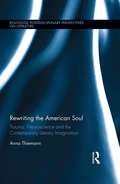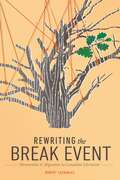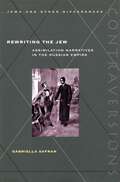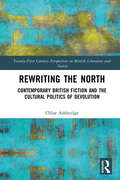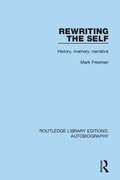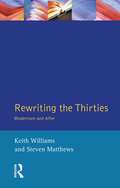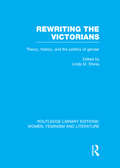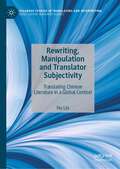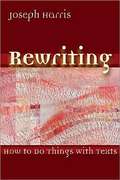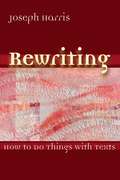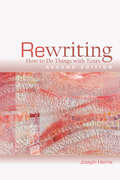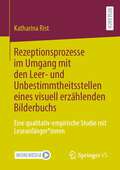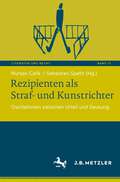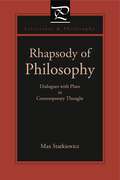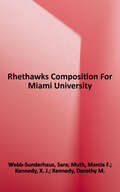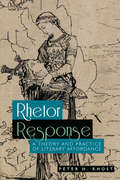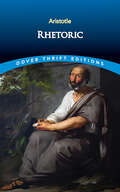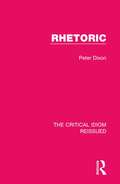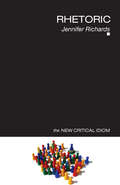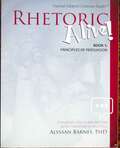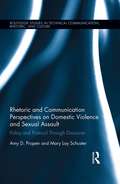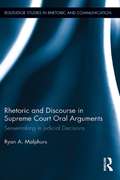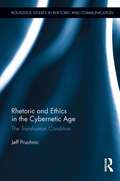- Table View
- List View
Rewriting the American Soul: Trauma, Neuroscience and the Contemporary Literary Imagination (Routledge Interdisciplinary Perspectives on Literature)
by Anna ThiemannRewriting the American Soul focuses on the political implications of psychoanalytic and neurocognitive approaches to trauma in literature, their impact on cultural representations of collective trauma in the United States, and their subversive appropriation in pre- and post-9/11 fiction. Anna Thiemann connects cutting edge trauma theory with the historical context from which it emerged and shows that contemporary novels encourage us to reflect critically on the cultural meanings and political uses of trauma. In doing so, it contributes to a new generation of trauma scholarship that challenges the dominant paradigm in literary and cultural studies. Moreover, the book intervenes in current debates about the relationship between literature and neuroscience insisting that the so-called neuronovel scrutinizes scientific developments and their political ramifications rather than adopting and translating them into aesthetic practices.
Rewriting the Break Event: Mennonites and Migration in Canadian Literature
by Robert ZachariasDespite the fact that Russian Mennonites began arriving in Canada en masse in the 1870s, Mennonite Canadian literature has been marked by a compulsive retelling of the mass migration of some 20,000 Russian Mennonites to Canada following the collapse of the “Mennonite Commonwealth” in the 1920s. This privileging of a seminal dispersal within the community’s broader history reveals the ways in which the 1920s narrative has come to function as an origin story, or “break event,” for the Russian Mennonites in Canada, serving to affirm a communal identity across national and generational boundaries. Drawing on recent work in diaspora studies, Rewriting the Break Event offers a historicization of Mennonite literary studies in Canada, followed by close readings of five novels that rewrite the Mennonite break event through specific strains of emphasis, including a religious narrative, ethnic narrative, trauma narrative, and meta-narrative. The result is thoughtful and engaging exploration of the shifting contours of Mennonite collective identity, and an exciting new methodology that promises to resituate the discourse of migrant writing in Canada.
Rewriting the Jew: Assimilation Narratives in the Russian Empire (Contraversions: Jews and Other Differences)
by Gabriella SafranIn the Russian Empire of the 1870s and 1880s, while intellectuals and politicians furiously debated the "Jewish Question," more and more acculturating Jews, who dressed, spoke, and behaved like non-Jews, appeared in real life and in literature. This book examines stories about Jewish assimilation by four authors: Grigory Bogrov, a Russian Jew; Eliza Orzeszkowa, a Polish Catholic; and Nikolai Leskov and Anton Chekhov, both Eastern Orthodox Russians. Safran introduces the English-language reader to works that were much discussed in their own time, and she situates Jewish and non-Jewish writers together in the context they shared. For nineteenth-century writers and readers, successful fictional characters were "types," literary creations that both mirrored and influenced the trajectories of real lives. Stories about Jewish assimilators and converts often juxtaposed two contrasting types: the sincere reformer or true convert who has experienced a complete transformation, and the secret recidivist or false convert whose real loyalties will never change. As Safran shows, writers borrowed these types from many sources, including the novel of education produced by the Jewish enlightenment movement (the Haskalah), the political rhetoric of "Positivist" Polish nationalism, the Bible, Shakespeare, and Slavic folk beliefs. Rewriting the Jew casts new light on the concept of type itself and on the question of whether literature can transfigure readers. The classic story of Jewish assimilation describes readers who redesign themselves after the model of fictional characters in secular texts. The writers studied here, though, examine attempts at Jewish self-transformation while wondering about the reformability of personality. In looking at their works, Safran relates the modern Eastern European Jewish experience to a fundamental question of aesthetics: Can art change us?
Rewriting the Journey in Contemporary Italian Literature
by Cinzia Sartini BlumThe mobility of women is a central issue in feminist analysis of literary works and historical periods. Rewriting the Journey in Contemporary Italian Literature explores the concept of the journey from feminist, psychoanalytic, and postcolonial perspectives, in order to offer an alternative understanding of "moving." Cinzia Sartini Blum examines the new literature of migration in Italian and journeys in the works of Biancamaria Frabotta, Dacia Maraini, Toni Maraini, and Maria Pace Ottieri, to demonstrate that women writers and migrant authors in contemporary Italy present journeys as events that are beyond heroic modern exploration and postmodern fragmentation.Using the mythical figure of Gradiva, Blum shows how contemporary Italian women writers have reinvented Gradiva to reveal subjectivities that challenge and overcome the postmodern melancholia and nihilism prevalent in contemporary male writers and thinkers. She also considers the connection between metaphorical and literal mobility, the role of the intellectual as cultural intermediary, the roles of women in cultural encounters within mass migrations, and how migrancy is a way of being in the postcolonial world.An impeccable piece of original scholarship, Rewriting the Journey in Contemporary Italian Literature will be of interest to feminist, literary, and postcolonial scholars.
Rewriting the North: Contemporary British Fiction and the Cultural Politics of Devolution (Twenty-First Century Perspectives on British Literature and Society)
by Chloe AshbridgeThis book shows how twenty-first-century writing about Northern England imagines alternative democratic futures for the region and the English nation, signalling the growing awareness of England as a distinct and variegated political formation. In 2016, the Brexit vote intensified ongoing constitutional tensions throughout the UK, which have been developing since the devolution of Scotland, Wales, and Northern Ireland in 1997. At the same time, British devolution developed a distinctively cultural registration as a surrogate for parliamentary representation and an attempt to disrupt the status of London as Britain’s cultural epicentre. Rewriting the North shifts this debate in a new direction, examining Northern literary preoccupation with devolution’s constitutional implications. Through close readings of six contemporary authors – Sunjeev Sahota, Sarah Hall, Anthony Cartwright, Adam Thorpe, Fiona Mozley, and Sarah Moss – this book argues that literary engagement with the North emphasises regional devolution's limited constitutional charge, calling instead for an urgent abandonment of the British centralised state form.
Rewriting the Self: History, Memory, Narrative (Routledge Library Editions: Autobiography #2)
by Mark FreemanOriginally published in 1993. This book explores the process by which individuals reconstruct the meaning and significance of past experience. Drawing on the lives of such notable figures as St Augustine, Helen Keller and Philip Roth as well as on the combined insights of psychology, philosophy and literary theory, the book sheds light on the intricacies and dilemmas of self-interpretation in particular and interpretive psychological enquiry more generally. The author draws upon selected, mainly autobiographical, literary texts in order to examine concretely the process of rewriting the self. Among the issues addressed are the relationship of rewriting the self to the concept of development, the place of language in the construction of selfhood, the difference between living and telling about it, the problem of facts in life history narrative, the significance of the unconscious in interpreting the personal past, and the freedom of the narrative imagination. Alpha Sigma Nu National Book Award winner in 1994
Rewriting the Thirties: Modernism and After (Longman Studies In Twentieth Century Literature)
by Keith Williams Steven MatthewsRewriting the Thirties questions the myth of the 'anti-modernist' decade. Conversely, the editors argue it is a symptomatic, transitional phase between modern and post-modern writing and politics, at a time of cultural and technological change.The text reconsiders some of the leading writers of the period in the light of recent theoretical developments, through essays on the ambivalent assimilation of Modernist influences, among proletarian and canonical novelists including James Barke and George Orwell, and among poets including Auden, MacNeice, Swingler and Bunting, and in the work of feminist writers Vera Brittain and Winifred Holtby. In this substantial remapping, the complexity and scope of literary-critical debate at the time is discussed in relation to theatrical innovation, audience attitudes to the mass medium of modernity - cinema - the poetics of suburbia, consumerism and national ideology, as well as the discursive strategies of British and American documentarism.
Rewriting the Victorians: Theory, History, and the Politics of Gender (Routledge Library Editions: Women, Feminism and Literature)
by Linda M. ShiresThis collection of essays, both feminist and historical, analyzes power relations between men and women in the Victorian period. This volume is the first to reshape Victorian studies from the perspective of the postmodern return to history, and is variously influenced by Marxism, sociology, anthropology, and post-structuralist theories of language and subjectivity. It analyzes the struggle for legitimacy and recognition in Victorian institutions and the struggle over meanings in ideological representation of the gendered subject in texts. Contributors cover diverse topics, including Victorian ideologies of motherhood, the male gaze, the cult of the male child genius in narrative painting, the press, and Victorian women and the French Revolution, discussing both well-known and less familiar Victorian texts.
Rewriting, Manipulation and Translator Subjectivity: Translating Chinese Literature in a Global Context (Palgrave Studies in Translating and Interpreting)
by Hu LiuThis book presents an in-depth analysis of Howard Goldblatt’s translation of Mo Yan’s Life and Death Are Wearing Me Out (L&D). It explores how Goldblatt translates the original novel under the influence of three major manipulative powers: poetics, ideology and patronage, as well as his own subjectivity (translator subjectivity), to achieve his objectives as a literary translator. The author analyses both the translation and its paratext to gain a more complete understanding of Goldblatt’s accomplishments, and examines how Goldblatt rewrites the original text under the influence of various patronage factors, such as the original author, publisher, editor, market expectancy, literary collaborator, and the target reader. This book provides a comprehensive picture of the production, reception and dissemination of Goldblatt’s translation, exposing the motivations behind his translation in full measure, and it will be of interest to students and scholars of Translation Studies, Comparative Literature and Literary Studies, and Chinese Culture and Literature.
Rewriting: How To Do Things With Texts
by Joseph Harris"Like all writers, intellectuals need to say something new and say it well. But unlike many other writers, what intellectuals have to say is bound up with the books we are reading . . . and the ideas of the people we are talking with. " What are the moves that an academic writer makes? How does writing as an intellectual change the way we work from sources? InRewriting, a textbook for the undergraduate classroom, Joseph Harris draws the college writing student away from static ideas of thesis, support, and structure, and toward a more mature and dynamic understanding. Harris wants college writers to think of intellectual writing as an adaptive and social activity, and he offers them a clear set of strategies-a set of moves-for participating in it.
Rewriting: How To Do Things With Texts
by Joseph Harris"Like all writers, intellectuals need to say something new and say it well. But unlike many other writers, what intellectuals have to say is bound up with the books we are reading . . . and the ideas of the people we are talking with." What are the moves that an academic writer makes? How does writing as an intellectual change the way we work from sources? In Rewriting, a textbook for the undergraduate classroom, Joseph Harris draws the college writing student away from static ideas of thesis, support, and structure, and toward a more mature and dynamic understanding. Harris wants college writers to think of intellectual writing as an adaptive and social activity, and he offers them a clear set of strategies—a set of moves—for participating in it.
Rewriting: How to Do Things with Texts, Second Edition
by Joseph Harris“Like all writers, intellectuals need to say something new and say it well. But for intellectuals, unlike many other writers, what we have to say is bound up with the books we are reading . . . and the ideas of the people we are talking with.” What are the moves that an academic writer makes? How does writing as an intellectual change the way we work from sources? In Rewriting, Joseph Harris draws the college writing student away from static ideas of thesis, support, and structure, and toward a more mature and dynamic understanding. Harris wants college writers to think of intellectual writing as an adaptive and social activity, and he offers them a clear set of strategies—a set of moves—for participating in it. The second edition introduces remixing as an additional signature move and is updated with new attention to digital writing, which both extends and rethinks the ideas of earlier chapters.
Rezeptionsprozesse im Umgang mit den Leer- und Unbestimmtheitsstellen eines visuell erzählenden Bilderbuchs: Eine qualitativ-empirische Studie mit Leseanfänger*innen
by Katharina RistRezeptionsprozesse im Umgang mit literarischer Unbestimmtheit gehören zu den zentralen Anforderungen des Literaturunterrichts und können bereits von Beginn der Primarstufe an herausgefordert und unterstützt werden. Die Entwicklung entsprechender didaktischer Modelle setzt empirische Befunde zum Umgang von Leseanfänger*innen mit den Leer- und Unbestimmtheitsstellen literarischer Werken voraus, wie sie die vorliegende qualitativ-empirische Studie liefert. Das theoretische Fundament bildet dabei die eigenständige Entwicklung einer an Konzepten aus der Literaturwissenschaft sowie der Kunst- und Medienforschung orientierten Systematik der Leer- und Unbestimmtheitsstellen visuell erzählender Bilderbücher. Darüber hinaus liegt der Studie eine gründliche Sichtung innerhalb unterschiedlicher Fachdisziplinen vorliegender theoretischer Annahmen zu den durch Leer- und Unbestimmtheitsstellen evozierten Rezeptionsprozessen zugrunde. Die Untersuchung von Rezeptionsgesprächen zu einem visuell erzählenden Bilderbuch im Rahmen der Studie macht nicht zuletzt das hohe Potenzial des visuell erzählenden Bilderbuchs als Rezeptionsgegenstand sowie des Umgangs mit literarischer Unbestimmtheit als zentralen Schritt der Rezeption für das literarische Lernen im Lese- und Literaturunterricht deutlich. Damit liefert sie einen wichtigen Beitrag zur empirischen Grundlagenforschung in der Literaturdidaktik.
Rezipienten als Straf- und Kunstrichter: Oszillationen zwischen Urteil und Deutung (Literatur und Recht #11)
by Nursan Celik Sebastian SpethRechtsprechung steht unter dem Diktat der Urteilspflicht und muss Mehrdeutigkeit daher einhegen und urteilend auflösen. Literatur hält Formen und Prozesse von Mehrdeutigkeit dagegen ohne Schwierigkeit aus. Sie werden als Potenzierung der ästhetischen Qualität sogar gerühmt und forciert. Die Beiträge des vorliegenden Bandes sind Texten und Rezeptionszusammenhängen gewidmet, die Rezipientinnen und Rezipienten explizit in eine Richterposition setzen. Konkret geht es um literarische Phänomene, bei denen Rezipierende nicht bloß verstehen und deuten, sondern (be- und ver-)urteilen – zum einen im engen (juristischen) und zum anderen im weiten (ästhetischen) Sinne des Urteilsbegriffs. Zu unterscheiden sind hierbei Laienurteile in Strafsachen und die Einforderung professioneller Urteile, bei denen Leserinnen und Leser (metaphorisch) als Kunstrichter angesprochen, konstruiert oder zu agieren verpflichtet werden. Das literaturgeschichtliche Spektrum reicht dabei vom 18. Jahrhundert bis zur Gegenwart, mit einem Schwerpunkt im frühen 20. Jahrhundert.
Rhapsody of Philosophy: Dialogues with Plato in Contemporary Thought (Literature and Philosophy)
by Max StatkiewiczThis book proposes to rethink the relationship between philosophy and literature through an engagement with Plato’s dialogues. The dialogues have been seen as the source of a long tradition that subordinates poetry to philosophy, but they may also be approached as a medium for understanding how to overcome this opposition. Paradoxically, Plato then becomes an ally in the attempt “to overturn Platonism,” which Gilles Deleuze famously defined as the task of modern philosophy. Max Statkiewicz identifies a “rhapsodic mode” initiated by Plato in the dialogues and pursued by many of his modern European commentators, including Nietzsche, Heidegger, Irigaray, Derrida, and Nancy. The book articulates this rhapsodic mode as a way of entering into true dialogue (dia-logos), which splits any univocal meaning and opens up a serious play of signification both within and between texts. This mode, he asserts, employs a reading of Plato that is distinguished from interpretations emphasizing the dialogues as a form of dogmatic treatise, as well as from the dramatic interpretations that have been explored in recent Plato scholarship—both of which take for granted the modern notion of the subject. Statkiewicz emphasizes the importance of the dialogic nature of the rhapsodic mode in the play of philosophy and poetry, of Platonic and modern thought—and, indeed, of seriousness and play. This highly original study of Plato explores the inherent possibilities of Platonic thought to rebound upon itself and engender further dialogues.
Rhethawks: Composition For Miami University
by X. J. Kennedy Webb-Sunderhaus Sara Muth Marcia F. Kennedy Dorothy M.This book is part of a long lineage of student thoughtfulness and creativity. This volume is first and foremost a showcase for the voices of students who have come before you. You will also find advice and resources from Miami composition instructors. Your ideas and voices are what count the most in the writing classroom, and your instructors will help you express them with more effectiveness.
Rhetor Response: A Theory and Practice of Literary Affordance
by Peter H. KhostBridging the disciplinary divide between writing and literature, Rhetor Response introduces the concept and pedagogical applications of “literary affordances”—the ways in which readers “use” and integrate literature into their own writing or lives. Unconcerned with authorial intent, interpretive meaning, or critical reception, “affordance” signifies a shift in focus from what literary texts mean and do to what one can do with them. This book presents both opportunities and challenges to writing studies, a field whose burgeoning disciplinary independence ironically relies on a sizable underclass of specialists in literature rather than writing. Incorporating elements of rhetorical theory, literary criticism, pedagogical methodology, political critique, and psychological and philosophical memoir, Peter H. Khost complicates and revives the relevance of literature—from belles lettres to fanfiction—by turning from interpretation to affordance in order to identify readers’ applications of literary textual features to unrelated lived situations. Rhetor Response theorizes and exemplifies literary affordance as a constructive step toward professional reconciliation, as well as an entry into greater textual power and pleasure for students and readers. It is a one-of-a-kind resource for college writing program administrators, faculty and scholars in English and writing studies, and graduate and advanced undergraduate students across both disciplines.
Rhetoric (Dover Thrift Editions: Philosophy)
by AristotleOne of the seminal works of Western philosophy, Aristotle's Rhetoric vastly influenced all subsequent thought on the subject — philosophical, political, and literary. Focusing on the use of language as both a vehicle and a tool to shape persuasive argument, Aristotle delineates with remarkable insight both practical and aesthetic elements and their proper combination in an effective presentation, oral or written. He also emphasizes the role of language in achieving precision and clarity of thought.The ancients regarded rhetoric as the crowning intellectual discipline — the synthesis of logical principles and other knowledge attained from years of schooling. Modern readers will find considerable relevance in Aristotelian rhetoric and its focus on developing persuasive tools of argumentation. Aristotle's examinations of how to compose and interpret speeches offer significant insights into the language and style of contemporary communications, from advertisements to news reports and other media.
Rhetoric (The Critical Idiom Reissued #18)
by Peter DixonFirst published in 1971, this book provides a historical account of the fortunes of Rhetoric. Beginning with a study of classical rhetorical theory and practice, it goes on to explore the impact of rhetoric on English literature and the renunciation of rhetoric from the late 17th century. The book concludes with a survey of the ways in which rhetoric was revived and re-modelled in the 20th century and its bearings on the practice and theory of literary criticism. This book will be of interest to those studying English literature and literary theory.
Rhetoric (The New Critical Idiom)
by Jennifer RichardsRhetoric has shaped our understanding of the nature of language and the purpose of literature for over two millennia. It is of crucial importance in understanding the development of literary history as well as elements of philosophy, politics and culture. The nature and practise of rhetoric was central to Classical, Renaissance and Enlightenment cultures and its relevance continues in our own postmodern world to inspire further debate.Examining both the practice and theory of this controversial concept, Jennifer Richards explores: historical and contemporary definitions of the term ‘rhetoric’ uses of rhetoric in literature, by authors such as William Shakespeare, Mary Shelley, William Wordsworth, Jane Austen, W.B. Yeats and James Joyce classical traditions of rhetoric, as seen in the work of Plato, Aristotle and Cicero the rebirth of rhetoric in the Renaissance and the Enlightenment the current status and future of rhetoric in literary and critical theory as envisaged by critics such as Kenneth Burke, Paul de Man and Jacques Derrida. This insightful volume offers an accessible account of this contentious yet unavoidable term, making this book invaluable reading for students of literature, philosophy and cultural studies.
Rhetoric Alive! Book 1: Principles of Persuasion
by Alyssan BarnesA one-semester or yearlong course for students in grades 10-12. Rhetoric Alive! Book 1: Principles of Persuasion, written by Alyssan Barnes, an experienced rhetoric teacher with a PhD in rhetoric, is a clear, compelling, and delightful text on rhetorical theory and practice. The highly engaging Rhetoric Alive! explores the principles of winsome speech as developed in the foremost text on persuasion, Aristotle's Rhetoric. The fifteen chapters of Rhetoric Alive! step through the essential components of persuasion: the three appeals; Ethos (speaker's credibility), Pathos (audience's emotion), and Logos (argument's reasoning), the three types of speech; Deliberative (exhort or dissuade), Ceremonial (praise or blame), Judicial (accuse or defend), and the five canons; Invention, Organization, Style, Memory, Delivery. Each chapter includes an exemplary classic text for analysis and discussion, spanning from Pericles's 'Funeral Oration' to Martin Luther King, Jr.'s, 'Letter from Birmingham Jail.' Students also have plenty of practice developing their own rhetorical skill through weekly workshops, imitation assignments, and oratory presentations.
Rhetoric and Communication Perspectives on Domestic Violence and Sexual Assault: Policy and Protocol Through Discourse (Routledge Studies in Technical Communication, Rhetoric, and Culture)
by Amy D. Propen Mary SchusterThis book brings rhetorical, legal, and professional communication perspectives to the discourse surrounding policy-making efforts within the United States around two types of violent crimes against women: domestic violence and sexual assault. The authors propose that such analysis adds to our understanding of rhetorical concepts such as kairos, risk perception, moral panic, genre analysis, and identity theory. Overall, the goal is to demonstrate how rhetorical, legal, and professional communication perspectives work together to illuminate public discourse and conflict in such complicated and ongoing dilemmas as how to aid victims of domestic violence and sexual assault, and how to manage the offenders of such crimes—social and cultural problems that continue to perplex the legal system and the social environment.
Rhetoric and Composition
by Steven LynnRhetoric and composition is an academic discipline that informs all other fields in teaching students how to communicate their ideas and construct their arguments. It has grown dramatically to become a cornerstone of many undergraduate courses and curricula, and it is a particularly dynamic field for scholarly research. This book offers an accessible introduction to teaching and studying rhetoric and composition. By combining the history of rhetoric, explorations of its underlying theories, and a survey of current research (with practical examples and advice), Steven Lynn offers a solid foundation for further study in the field. Readers will find useful information on how students have been taught to invent and organize materials, to express themselves correctly and effectively, and how the ancient study of memory and delivery illuminates discourse and pedagogy today. This concise book thus provides a starting point for learning about the discipline that engages writing, thinking, and argument.
Rhetoric and Discourse in Supreme Court Oral Arguments: Sensemaking in Judicial Decisions (Routledge Studies in Rhetoric and Communication)
by Ryan MalphursWhile legal scholars, psychologists, and political scientists commonly voice their skepticism over the influence oral arguments have on the Court’s voting pattern, this book offers a contrarian position focused on close scrutiny of the justices’ communication within oral arguments. Malphurs examines the rhetoric, discourse, and subsequent decision-making within the oral arguments for significant Supreme Court cases, visiting their potential power and danger and revealing the rich dynamic nature of the justices’ interactions among themselves and the advocates. In addition to offering advancements in scholars’ understanding of oral arguments, this study introduces Sensemaking as an alternative to rational decision-making in Supreme Court arguments, suggesting a new model of judicial decision-making to account for the communication within oral arguments that underscores a glaring irony surrounding the bulk of related research—the willingness of scholars to criticize oral arguments but their unwillingness to study this communication. With the growing accessibility of the Court’s oral arguments and the inevitable introduction of television cameras in the courtroom, this book offers new theoretical and methodological perspectives at a time when scholars across the fields of communication, law, psychology, and political science will direct even greater attention and scrutiny toward the Supreme Court.
Rhetoric and Ethics in the Cybernetic Age: The Transhuman Condition (Routledge Studies in Rhetoric and Communication #17)
by Jeff PruchnicIt has become increasingly difficult to ignore the ways that the centrality of new media and technologies — from the global networking of information systems and social media to new possibilities for altering human genetics — seem to make obsolete our traditional ways of thinking about ethics and persuasive communication inherited from earlier humanist paradigms. This book argues that rather than devoting our critical energies towards critiquing humanist touchstones, we should instead examine the ways in which media and technologies have always worked as crucial cultural forces in shaping ethics and rhetoric. Pruchnic combines this historical itinerary with critical interrogations of diverse cultural and technological sites — the logic of video games and artificial intelligence, the ethics of life extension in contemporary medicine, the transition to computer-automated trading in world stock markets, the state of critical theory in the contemporary humanities — along with innovative analyses of the works of such figures as the Greek Sophists, Kenneth Burke, Martin Heidegger, Michel Foucault, Friedrich Nietzsche, and Gilles Deleuze. This book argues that our best strategies for crafting persuasive communication and producing ethical relations between individuals will be those that creatively replicate and appropriate, rather than resist, the logics of dominant forms of media and technology.
